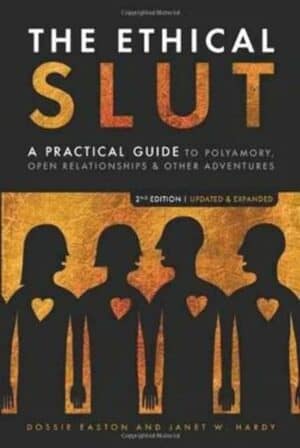What if everything you’ve been taught about love and relationships isn’t the only way? “The Ethical Slut: A Practical Guide to Polyamory, Open Relationships, and Other Freedoms in Sex and Love” by Dossie Easton and Janet Hardy boldly asks this question and so much more. For me, discovering this book was a pivotal moment in understanding myself and the way I love. Often considered a beginner’s guide to non-monogamous relationships, it’s one of my favorites and a must-read for anyone looking to improve their relationships—whether you’re thinking of opening up an existing one or are a serial monogamist.
My first encounter with this book was in 2011. I excitedly went to Kinokuniya with a female friend to buy it, only to be met with a judgmental look when she saw the provocative title! Interestingly, it had been recommended to me by another female friend I’d met through a Facebook group around the same time.
advertisement
The classic guide to love, sex, and intimacy beyond the limits of conventional monogamy has been fully updated to reflect today’s modern attitudes and the latest information on nontraditional relationships.
“One of the most useful relationship books you could ever read, no matter what your lifestyle choices. It’s chock-full of great information about communication, jealousy, asking for what you want, and maintaining a relationship with integrity.”–Annie Sprinkle, PhD, sexologist and author of Dr. Sprinkle’s Spectacular Sex
What Is This Book About?
“The Ethical Slut” is more than just a guide to open relationships; it’s a book full of useful advice and invaluable insights into personal development, offering practical tools for self-reflection and growth. This book is for everyone, whether you’re thinking about opening up your existing relationship, are a serial monogamist, or are simply curious about different types of relationships. It challenges our preconceived notions about love, relationships, and life in general; broadens our perspectives; and helps us develop healthy and fulfilling relationships.
The book revolves around ethical communication, consent, shedding shame about sexuality, and pleasure. It guides readers on developing healthy practices that can be applied to any relationship. The authors talk about various approaches to open relationships, emphasizing how to tailor them to each person’s unique needs and preferences in an ethical way. They also touch up on the complexities and challenges of having multiple partners, providing strategies to cultivate healthier and more consensual relationships.
This book boldly confronts social norms and stereotypes about non-monogamy, a particularly impressive feat considering its first publication was in 1997. They take readers on a thought-provoking journey to better understand sexual freedom, encouraging them to challenge societal expectations and ideas about relationships, love, and sexuality. This book offers a fresh perspective that will lead you to reconsider your preconceived notions. It covers essential topics like the abundance of love, developing “slut skills,” safe sex, setting boundaries, and even the concept of “unethical sluts.”

What This Book Taught Me
I’ve personally experienced a great deal of shame and guilt about my sexuality and how I approached relationships. From a young age, I was drawn to people of all genders. I used to think that everyone saw the world the same way I did. As I grew older, I realized how different I was from my friends, which resulted in a lot of shaming and similar experiences. It was extremely difficult to find friends who shared the same beliefs regarding sexuality and relationships, and this made me feel like an outlier. I’m sure many of us have gone through similar situations. Non-monogamy does not always fit into the traditional life narrative, which is often based on a linear progression of birth, education, career, marriage, children, and death. I carried this shame with me for a long time, but this book has truly helped me accept myself in many ways, and to finally help me find the vocabulary to express how I experienced life and love.
A substantial portion of the book is dedicated to addressing the shame associated with our sexuality and sexual expressions. The moment we hear the word “slut,” we immediately tend to pass judgment. Personally, I found the authors’ definition of an “ethical slut”— as someone who bravely pursues their desires and openly expresses their sexuality in a way that feels authentic to them — to be extremely empowering.
I particularly liked how this book deals with jealousy in relationships, which I found very insightful (I wrote a separate post about dealing with jealousy in poly relationships, which you can read here). According to the authors, only you can make yourself jealous or insecure. When you blame your partners for making you jealous, you are surrendering control over your own emotions and your ability to manage them. This approach doesn’t help anyone, and you end up not finding any solutions to these issues at all. Because if it’s someone else’s fault that you’re jealous, what can you do? Instead, the authors encourage us to own our feelings and emotions. Doing so empowers us and allows us to figure out the triggers, discuss them with our partners, and come up with a mutually beneficial solution.
The authors also discuss the value of being vulnerable with our partners, emphasizing how it can lead to deeply bonding experiences. They highlight that everyone is seeking validation and acceptance, and if not from anyone else, we need it from our partners. You’ll find such nuggets of wisdom throughout the book, which I find extremely empowering.
Why This Book
Aside from the core relationship topics, this book is very inclusive of all genders and relationship types, extending beyond just ethical non-monogamy. It also includes valuable takes on navigating kinky relationships.
The inclusion of real-life stories and narratives from people of diverse backgrounds who practice polyamory and other forms of open relationships significantly enhances the book’s authenticity. These stories are an invaluable resource for those new to open relationships because they provide reassurance about how these relationships work in real life, how others practice them, what worked for them, what didn’t, and so on. These personal stories have helped me immensely, and they gave me a sense of belonging at a time when my knowledge and vocabulary on these subjects were limited.
I strongly recommend reading “The Ethical Slut,” especially if you are interested in any type of open relationship. I like to think that this book is not only for non-monogamous people but also for anyone interested in learning about various types of relationships, personal development, dealing with emotions, and overall relationship improvement. It teaches readers how to accept their own wholesomeness and vulnerability, as well as how to overcome feelings of shame and guilt about their sexuality. The book encourages us to pursue love and life in an ethical and healthy way while remaining true to ourselves, ultimately embracing the concept of being an ethical slut!








